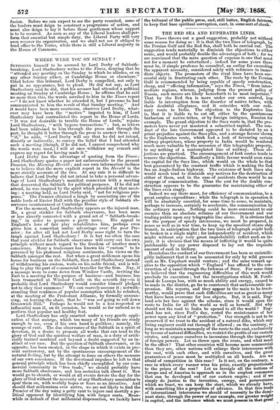WHERE WERE YOU ON SUNDAY ?
Sirreosisu himself to be accused by Lord Derby of Sabbath- breaking, Lord Shaftesbury writes to the Times, denying that he " attended any meeting on the Sunday to which he alludes, or on any other Sunday either, at Cambridge House or elsewhere." Cited before this tribunal, Lord Derby is compelled, not only to put in an appearance, but to plead. He did not say, as Lord Shaftesbury said he did, that his accuser had attended a political meeting on Sunday at Cambridge House ; he affirms that he said no more than this, the words ascribed to him in the Times report —" I do not know whether he attended it, but I presume he had communicated to him the result of that Sunday meeting." And it would have been more courteous, observes Lord Derby, what- ever may have been the " motive " imputed to him, if Lord Shaftesbury had contradicted the report in the House of Lords. " It was not desirable to trouble the House of Lords," rejoins Lord Shaftesbury, " with bygone transactions " ; but, as letters had been addressed to him through the press and through the post, he thought it better through the press to answer them ; and "if," he adds, "Lord Derby will say that he did not intend, directly or indirectly, to convey the belief that I had attended such a meeting (though, if he did not, I cannot comprehend why the words were used,) I will at once withdraw my remark and express my regret for having made it." Lord Derby has the advantage of quoting from the Times ; Lord Shaftesbury quotes a paper not unfavourable to the present Premier, the Morning Herald ; and our own information inclines us to believe that the more explicit report in the Herald is the more strictly accurate of the two. At any rate it is difficult to believe that Lord Derby did not intend to take a personal advan- tage of Lord Shaftesbury's manifest connexion with a meeting that desecrated the Sabbath for political purposes. If he did not attend, he was inspired by the spirit which presided at that meet- ing ; a meeting held, as Lord Derby said, " not for religious pur- poses." Tho Premier obtained a laugh by associating one of the noble lords of Exeter Hall with the peculiar style of Sabbath ob- servance countenanced at Cambridge House. For the moment, Lord Shaftesbury appears as the injured man. He, a great stickler for Sabbath observance, has been more or less directly connected with a grand act of " Sabbath-break- ing," in order to promote a party move. His appeal to England's love of fair play rehabilitates him, perhaps, even gives him a somewhat undue advantage over the poor Pre- mier ; for after all had not Lord Derby some right to turn the laugh against Lord Shaftesbury ? It is but too often the case that your stickler for Sabbath observance will carry out his own principle without much regard to the freedom of another man's conscience. Many a tradesman has known his " custom " to be governed by his professed religious sentiments, his views on the Sabbath amongst the rest. But when a great nobleman opens his house for business on the Sabbath, then Lord Shaftesbury instead of withdrawing his custom, waits on his noble friend, and is wil- ling to play the part of commercial traveller for the firm. Nay, if a message were to come down from Windsor Castle, inviting the Earl to a meeting for the purpose of business—and business has been transacted at Windsor Castle on the seventh day—is it probable that Lord Shaftesbury would consider himself pledged not to obey that summons ? We can scarcely assume it ; notwith- standing that readiness of popular assumption which he rebuked, at the meeting of the Protestant Alliance, by formally announ- cing, on leaving. the chair, that he "was not going to roll down Greenwich Hill." Perhaps he would not be a less respected or influential man if, on fit occasion, he would so far unbend as to perform that popular and healthy feat.
Lord Shaftesbury has only smarted under a very gentle appli- cation of that scourge, which too many of his friends are ready enough to use, even if his own hand is guiltless ; namely, the scourge of cant. The due observance of the Sabbath in a spirit of devotion, in a desire to promote all works that can tend to the glory of God and the spiritual welfare of man, is a duty of artifi- cially trained mankind and beyond a doubt suggested by an in- stinct of our race. But the question of Sabbath observance, or its opposite, has been created, in the shape in which it exists in pre- sent controversy, not by the spontaneous encouragement of the natural feeling, but by the attempt to force on others the measure of our own conscience. If the devotional impulses be left to that general principle which has been chiefly exemplified by our com- mercial community in "free trade," we should probably have more Sabbath observance, and less sectarian talk about it. Men would go to church, or would at all events devote the day for the glory of God without the necessity of any Shaftesbury association to spur them on, with worldly hopes or fears as an incentive. And should that millennium ever arrive, we are not likely to find the Premier of the day using a petty cant to injure and mortify a po- litical in by identifying him with larger cants. Mean- while n default of that millennial dispensation, we luckily have
the tribunal of the public press, and, still better, English fairness, to keep that base spiritual corruption, cant, in some sort of check.


























 Previous page
Previous page